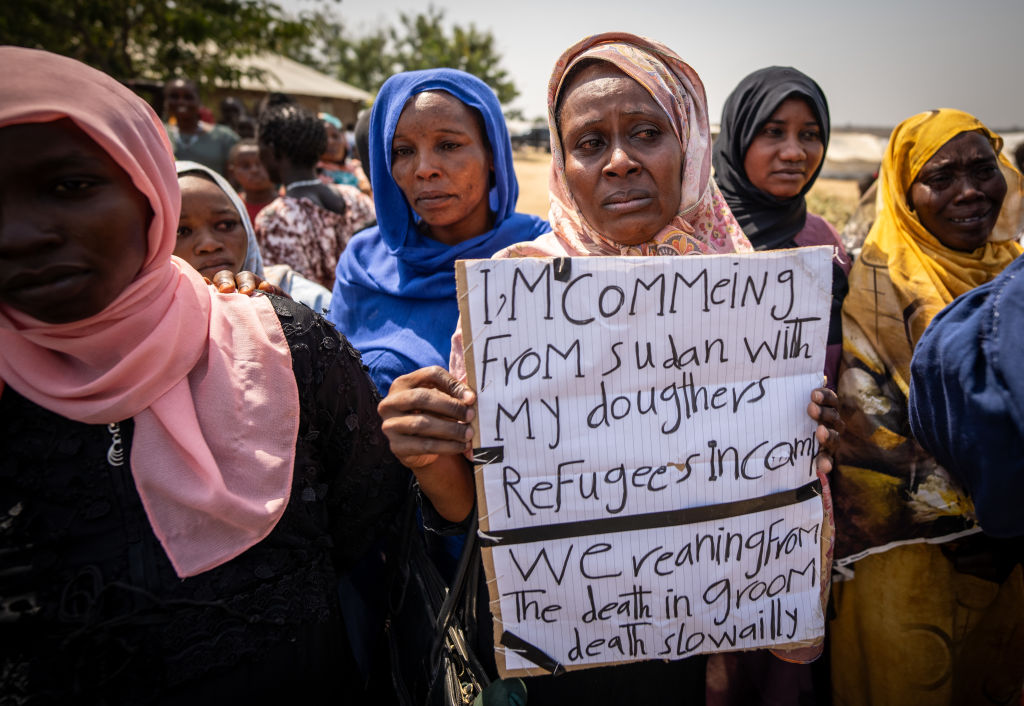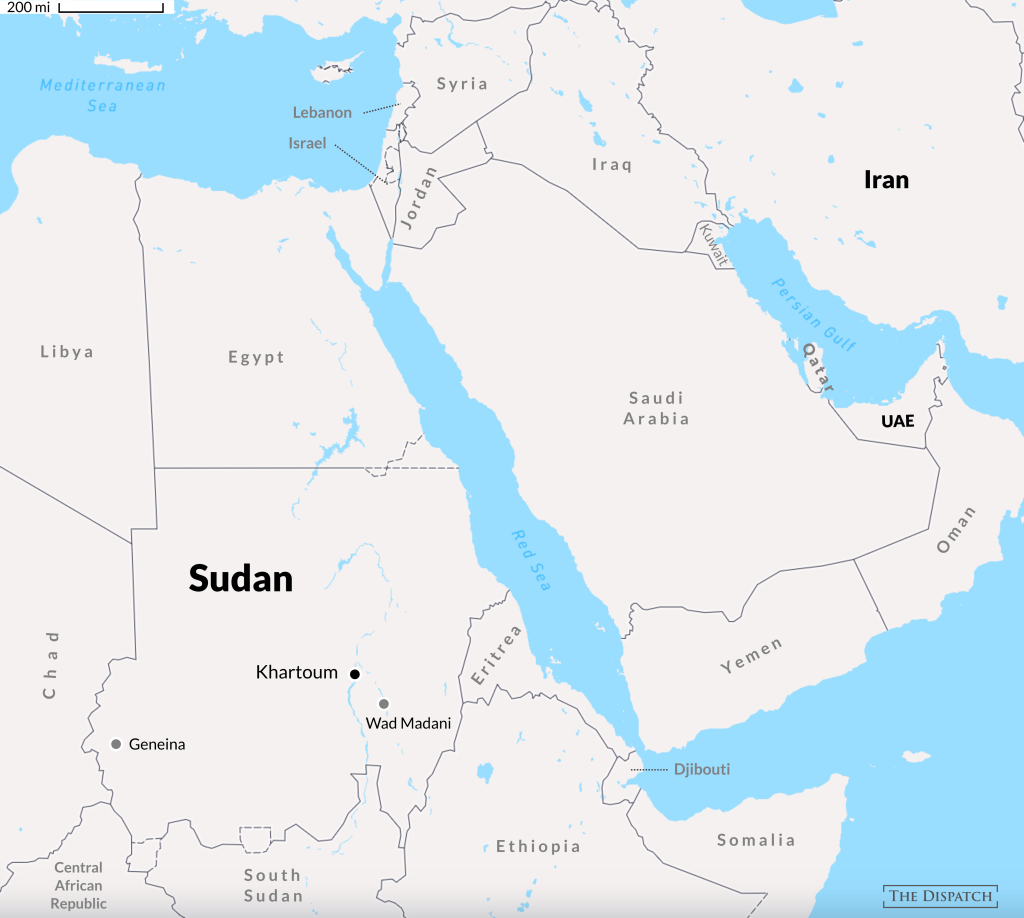Happy Wednesday! Some bars have begun using a new beer glass that is filled from the bottom up and sealed by a magnet. Sellers of the glass pitch it as a way to save bartenders time—but we’re pretty sure they just wanted to invent a way to shotgun a pint glass.
Quick Hits: Today’s Top Stories
- U.S. and Chinese officials met in Beijing on Tuesday to kick off a joint working group that will address the flow of fentanyl into the United States and the chemical shipments from China used to make the drug. The talks are the product of President Joe Biden and Chinese President Xi Jinping’s summit in San Francisco last November. “We reached common understanding on the work plan,” China’s Minister of Public Security Wang Xiaohong said yesterday. National Security Council spokesman John Kirby said the meeting represented “a good start, but it is just a start.”
- Kataib Hezbollah, an Iranian-backed militia group in Iraq, announced the suspension of attacks on U.S. forces on Tuesday. “As we announce the suspension of military and security operations against the occupation forces—in order to prevent embarrassment of the Iraqi government—we will continue to defend our people in Gaza in other ways,” Ahmad al-Hamidawi, the group’s leader, said in a statement yesterday. The announcement comes two days after a drone strike that the Pentagon said had “the footprints of Kataib Hezbollah” killed three Americans and wounded dozens of others at a base in Jordan near the Syrian border—an attack for which the U.S. has vowed a strong response.
- The House Homeland Security Committee voted 18-15 early Wednesday morning—entirely along party lines—to advance two articles of impeachment against Homeland Security Secretary Alejandro Mayorkas: for his “willful and systemic refusal to comply with the law” and “breach of public trust.” GOP Rep. Mark Green of Tennessee—chairman of the committee—argued that, “for three years, Secretary Mayorkas has willfully and systemically refused to comply with the laws enacted by Congress, and he has breached the public trust. His actions created this unprecedented crisis, turning every state into a border state.” A full House vote on the articles of impeachment could come as early as next week.
- The Labor Department reported Tuesday that job openings ticked up from an upwardly revised 8.9 million in November to 9.0 million in December, bucking forecasts predicting a decline in openings. The hires rate also increased slightly, from 3.5 percent in November to 3.6 percent last month. But the quits rates—a sign of workers’ confidence in their ability to find new employment—remained at 2.2 percent, the lowest level in over three years.
Sudan Still Gripped by Brutal War

Safaa Abdel Karim, a member of the Masalit tribe from Geneina in West Darfur, told Reuters last month how she watched members of the Rapid Support Forces (RSF)—a paramilitary group allied with mostly Arab militias at war with the Sudanese Armed Forces (SAF)—beat her 2-year-old son to death just 10 kilometers from the border with Chad. Abdel Karim and her children were trying to escape the days-long massacre that had already claimed her husband’s life.
The RSF fighters killed Abdel Karim’s son, Ibrahim, because he was a boy. “You zurga won’t stay in El Geneina,” she recalled the RSF men shouting, using a derogatory term for people with darker skin. “They said if the boy grows up, he will fight us.” When Abdel Karim, also carrying her infant daughter, tried to intervene to save her son, one of the men shot her below the shoulder. She was one of 40 mothers to recount similar instances of gender- and ethnically motivated killings in the area.
The brutal war in Sudan between the once-allied RSF and SAF has claimed more than 10,000 lives and displaced some 6 million people since it began in April of last year. The conflict carries echoes of previous atrocities in Sudan and in Darfur in particular, where Janjaweed militias—the precursor to the RSF, backed by the then-dictator, Omar al-Bashir—committed genocide in the early 2000s. The war shows few signs of abating in its tenth month, even as the SAF loses ground. Rival regional powers are reportedly backing opposing sides in the hopes of gaining influence once the war is over, but it’s a strategy that may ultimately prolong the violence. The U.S., for its part, has accused both sides of war crimes and the RSF of ethnic cleansing and crimes against humanity, but has seen little progress in its efforts to help broker peace.
The seeds of this war were sown during Bashir’s dictatorship, when the autocrat elevated the RSF to keep the country’s army from growing too powerful, pitting the group’s two leaders against each other. That plan backfired for Bashir, as we explained back in April:
Army chief Gen. Abdel Fattah al-Burhan commands Sudan’s military, while Mohamed Hamdan “Hemedti” Dagalo runs the Rapid Support Forces (RSF). […] Burhan and Hemedti joined forces to help oust Bashir following widespread protests in 2019 and participated in discussions with a civilian transitional government—before executing a coup in 2021 and cracking down on protests. Both assented to a United Nations-backed framework for restoring civilian rule in December 2022, but they clashed over combining forces.
By April 2023, the two generals and their armies had come to blows, and fighting that began in the capital of Khartoum has since spread to all corners of the country. The RSF reinforced its control over its historical center of power in Darfur—including by allegedly perpetrating war crimes against the region’s civilian population—and regained strongholds in the capital of Khartoum. The SAF maintains control over much of the east and north, running operations from the eastern city of Port Sudan, but has repeatedly given up ground in recent months. The RSF most notably gained control of Wad Madani—a city southeast of Khartoum and at the heart of Sudan’s breadbasket—in December. “It’s a very dynamic battlefield situation still, but the RSF has demonstrated more of an ability to take land and territory,” said Cameron Hudson, a former chief of staff to successive special envoys to Sudan and a current senior associate of the Africa Program at the Center for Strategic and International Studies.
The humanitarian impact of the war has been devastating. Recent U.N. estimates suggest that Sudan (a country of some 45 million people) is currently experiencing the worst crisis of internally displaced people—or those who have been forced to flee but have not crossed international borders—in the world. The conflict has forced 6 million people from their homes since April, and the country was already host to 3 million internally displaced people. Thus, 13 percent of the world’s internally displaced people are in Sudan, a U.N. analysis suggests. The country is also on the verge of famine, as fighting devastates local agriculture; by May, hundreds of thousands of Sudanese people could fall into what the U.N. calls “catastrophic hunger,” at risk of starvation.
The fighting on both sides has often featured brutal tactics. In December, U.S. Secretary of State Antony Blinken officially accused both sides of war crimes and the RSF, in its actions in Darfur in particular, of committing crimes against humanity and ethnic cleansing. Much of that verbiage comes from the Rome Statute, a U.N. document that established the International Criminal Court (ICC). “The RSF and allied militias have terrorized women and girls through sexual violence, attacking them in their homes, kidnapping them from the streets, or targeting those trying to flee to safety across the border,” Blinken said. “In haunting echoes of the genocide that began almost 20 years ago in Darfur, we have seen an explosion of targeted violence against some of the same survivors’ communities.”
In July, the ICC opened an investigation into both sides’ potential crimes in Darfur. Karim Khan, the ICC’s lead prosecutor, told the U.N. Security Council on Monday that “there are grounds to believe” the RSF and SAF have committed war crimes there.
But far from seeming close to an end, the fighting and its disastrous effects are only continuing—with the help of regional powers vying for influence. The United Arab Emirates (UAE) has been credibly accused of providing the RSF with weapons—including armed drones, howitzer artillery weapons, and anti-aircraft missiles—since the beginning of the conflict. Though the UAE denies the allegations, the Biden administration has reportedly raised the issue of the war, both publicly and privately, with the Emiratis. One of the UAE’s regional rivals, Iran, has also picked a side, supplying drones capable of carrying precision-guided munitions to the SAF. “Sudan is an important strategic prize for all of these countries in the region and in the Gulf,” Hudson told TMD. “And to the extent that any of these countries can ingratiate themselves with the potential victor, I think they see it as in their strategic interest to do that.”

What makes Sudan such a prize? Its 400-mile stretch of Red Sea coastline is incredibly valuable, particularly at a time when Yemen-based Houthi rebels, backed by Iran, are endangering global commerce through the waterway. Proxies across the western side of the shipping lane could be a potential boon for Iran, Hudson explained. Equally, for countries that would like to secure shipping in the region, a foothold across the Red Sea would be strategically important.
For the Gulf states, the country’s strategic importance may also be a question of Sudan’s latent agricultural capacity. “There’s a real food security issue in the Gulf countries, who see Sudan as their breadbasket and as their potential breadbasket,” Hudson said. “Because even though it’s a net exporter of grain and livestock and other essential food commodities, it is also completely falling short of its potential.”
While plenty of regional and global actors have attempted to bring the two sides together to negotiate an end to the conflict, that has so far proved intractable. Saudi Arabia, another powerful Gulf state, has joined the U.S. in efforts to facilitate several rounds of peace talks and negotiations for humanitarian ceasefires. While several ceasefires were established early in the conflict, they were quickly violated, and it’s been months since a truce has been called. When the Intergovernmental Authority for Development (IGAD), a regional bloc of African nations, last week called on the two rival leaders to meet face-to-face, Burhan and Sudan’s de facto government responded by pulling Sudan’s participation from the group—suggesting the will to negotiate might not be terribly strong. And even if the fighting were to end, any political solution would likely be complex in the absence of strong civil society figures or groups ready to replace military rule with a civilian government.
Despite its efforts to engage, the U.S. lacks a key tool in its relations with Sudan: The Biden administration has not appointed anyone to be the special envoy to Sudan, a position first created by then-President George W. Bush. Rather, a special envoy for the Horn of Africa has been responsible for the increasingly combustible region, including the Sudanese civil war.
But President Biden has recently faced bipartisan calls to fill the Sudan-specific position. “We are concerned that the lack of a dedicated special envoy, who would report directly to the Secretary of State and who would internally coordinate and lead U.S. government efforts, and who may serve as a focal point and driver for international diplomatic and humanitarian efforts, is severely inhibiting the United States’ ability to engage most forcefully towards a resolution to the crisis,” Democratic Sens. Tim Kaine and Mark Warner of Virginia said in December.* Sens. Ben Cardin of Maryland and Jim Risch of Idaho, the chair and ranking member of the Senate Foreign Relations Committee, respectively, put forward a Senate resolution to that same effect in December, and earlier this week, a bipartisan group of representatives on the House Foreign Affairs Committee introduced a resolution calling on the Biden administration to appoint a special envoy.
Hudson, who served on the staffs of several special envoys, argued the U.S. may have fundamentally shifted the way it thinks about Sudan since the appointment of the first special envoy. “It’s going to take something external to Sudan to get us to care about Sudan,” he told TMD, pointing to the potential proliferation of jihadist groups or deeper Iranian involvement in the crisis as potential motivating factors for more assertive U.S. action. “Whereas before, we were motivated by a humanitarian imperative, by a moral imperative, by wanting to see a dictatorship removed and democracy installed—those are no longer motivating factors for Washington. And that’s a big shift because the lens is much more defensive and much less optimistic about the future of this place.”
Worth Your Time
- Writing for Politico, former congressman and recent GOP presidential candidate Will Hurd outlined his vision for the responsible development of artificial intelligence (AI). Hurd was a board member of OpenAI until last summer and believes that artificial general intelligence (AGI), if developed without guardrails, could pose catastrophic risks. “Artificial general intelligence will be an evolution of AI that can understand, learn and apply intelligence to a wide range of problems, not just those for which it was specifically trained,” he wrote. “Indistinguishable from human cognition, AGI will enable solutions to complex global issues, from climate change to medical breakthroughs. If unchecked, AGI could also lead to consequences as impactful and irreversible as those of nuclear war. … Who can be trusted to develop such a powerful tool and weapon? Who should be entrusted with the tool once it’s created? How do we ensure the discovery of AGI is a net positive for humanity, not an extinction-level event? As this technology becomes more science fact than science fiction, its governance can’t be left to the whims of a few people. Like the nuclear arms race, there are bad actors, including our adversaries, moving forward without ethical or human considerations.”
Presented Without Comment
Associated Press: Justice Department Investigating Democratic Rep. Cori Bush Over Alleged Misuse of Campaign Funds
Toeing the Company Line
- What’s the latest from the campaign trail? How could the debate over immigration shape the 2024 election? Mike was joined by John, Drucker, Grayson, and James to discuss all that and more on last night’s Dispatch Live (🔒). Members who missed the conversation can catch a rerun—either video or audio-only—by clicking here.
- In the newsletters: Nick dove into (🔒) the fever dream that is right-wing influencers’ latest conspiracy theory: Taylor Swift and Travis Kelce teaming up in a Pentagon “psy op” to reelect Joe Biden.
- On the podcasts: Sarah and Jonah discuss (🔒) Martin Scorsese’s film adaptation of David Grann’s Killers of the Flower Moon on The Dispatch Book Club, and Jonah is joined by journalist and politician Daniel Hannan on the latest episode of The Remnant to explore when and why America began to take a turn for the crazy.
- On the site today: Elias Ferenczy explains the legal fight between Biden and Texas Gov. Greg Abbott over the border, and Jonah analyzes former President Donald Trump’s NATO bashing.
Let Us Know
What role, if any, do you think the U.S. has in mediating conflicts like the one in Sudan?
Correction, January 31, 2024: This newsletter originally misidentified the Democratic senator from Virginia as Mark Warren rather than Mark Warner.








Please note that we at The Dispatch hold ourselves, our work, and our commenters to a higher standard than other places on the internet. We welcome comments that foster genuine debate or discussion—including comments critical of us or our work—but responses that include ad hominem attacks on fellow Dispatch members or are intended to stoke fear and anger may be moderated.
With your membership, you only have the ability to comment on The Morning Dispatch articles. Consider upgrading to join the conversation everywhere.